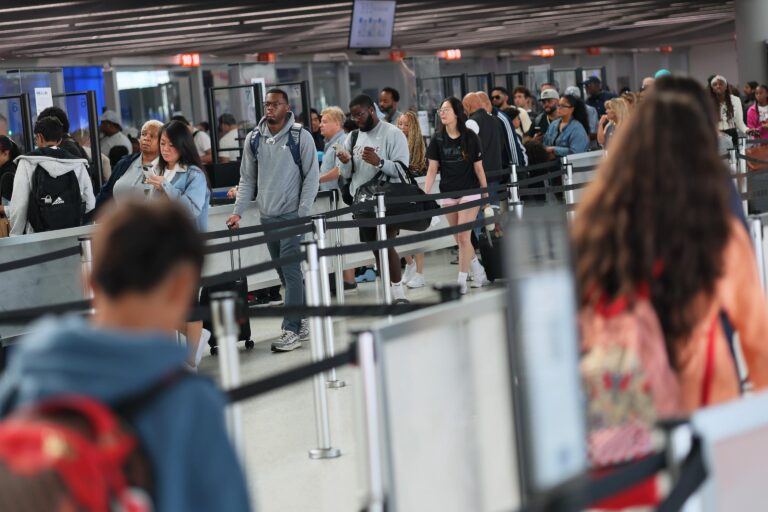Travel Challenges Amid the Prolonged Government Shutdown: What You Need to Know
Airport Security and Customs: Navigating Increased Delays
The ongoing government shutdown has significantly strained airport security and customs operations nationwide. With many federal employees working without pay or furloughed, staffing shortages have led to longer queues and slower processing times at major airports. This situation has heightened stress levels among security personnel, potentially affecting their performance and vigilance. Travelers should anticipate wait times that rival or surpass previous records, particularly during busy travel periods, and plan to arrive well in advance of their flights.
The Department of Homeland Security has activated contingency protocols to ensure essential functions continue, but many non-essential staff remain furloughed or unpaid, reducing the efficiency of security screenings and customs inspections. Key considerations for travelers include:
- Prolonged wait times at TSA checkpoints and customs clearance
- Possible delays in baggage handling and secondary security checks
- Limited customer support for inquiries related to flights and customs procedures
| Airport | Average Security Wait (minutes) | Customs Processing Duration |
|---|---|---|
| JFK International Airport | 45+ | 30+ minutes |
| Los Angeles International (LAX) | 50 | 35 minutes |
| Chicago O’Hare | 40 | 25-30 minutes |
Federal Travel Services: Delays and Reduced Availability
The shutdown has also disrupted federal travel-related services, causing significant delays and operational limitations. Agencies responsible for issuing passports, visas, and managing official travel are operating with minimal staff, resulting in postponed appointments and extended processing times. Additionally, some government-run transportation services, such as federal shuttles and official vehicle rentals, have been scaled back or temporarily suspended.
Travelers should be prepared for the following impacts:
- Longer wait periods for passport and visa processing, potentially affecting travel schedules
- Reduced hours or temporary closures at federally managed travel offices
- Limited access to support services for federal employees and contractors
- Increased necessity to check agency websites or contact helplines for the latest updates
| Service | Current Status | Estimated Delay |
|---|---|---|
| Passport Processing | Operating with limited capacity | 4 to 6 weeks |
| Visa Issuance | Suspended at most locations | Indeterminate |
| Federal Travel Reimbursements | Payment delays | Up to 30 days |
| Official Transportation Services | Reduced availability | Varies by location |
Effective Strategies to Manage Travel Disruptions During the Shutdown
Staying well-informed and prepared is essential when facing travel disruptions caused by the government shutdown. Travelers should prioritize official airline and airport sources for the most accurate, up-to-date information, as third-party platforms may not reflect real-time changes. Anticipate longer security lines due to limited TSA staffing and streamline your screening process by carrying minimal hand luggage and using digital boarding passes. If you are enrolled in expedited screening programs like TSA PreCheck, verify that your membership remains active during this period.
Recommended tips to reduce inconvenience include:
- Monitoring flight status frequently within 24 hours before departure
- Opting for flexible or refundable tickets to allow easy itinerary changes
- Arriving at airports earlier than usual to accommodate slower processing
- Keeping printed copies of essential documents as a backup to digital versions
- Downloading airline and airport apps that offer offline access to boarding passes and terminal maps
| Service | Shutdown Impact | Traveler Recommendations |
|---|---|---|
| Security Screening | Reduced TSA staff causing longer waits | Arrive 2+ hours early; use mobile boarding passes |
| Customs and Border Protection | Fewer personnel leading to delays | Prepare documentation; exercise patience |
| Flight Information Displays | Possible delays or offline status at some airports | Use airline mobile apps for real-time updates |
Adapting to Uncertainty: Booking Flexibility and Travel Insurance Insights
Given the unpredictable nature of the government shutdown, adopting a flexible mindset toward travel plans is crucial. Airlines and hotels may alter cancellation and rebooking policies with little notice, so travelers should stay vigilant by regularly checking travel alerts and maintaining thorough records of all bookings and communications. Booking through platforms that offer free cancellations or date changes can help mitigate financial risks.
Travel insurance has become an indispensable tool in this environment. When selecting coverage, scrutinize policies for clauses related to government shutdowns and administrative disruptions. Since many standard plans exclude shutdown-related cancellations, consider purchasing ‚Äúcancel for any reason‚ÄĚ policies or those with expanded coverage for political or governmental events.
| Advice | Importance |
|---|---|
| Maintain both digital and physical copies of all travel documents | Facilitates claims and itinerary changes during disruptions |
| Choose refundable or flexible booking options | Reduces financial loss if plans must change |
| Verify travel insurance coverage specifics | Ensures protection against shutdown-related risks |
| Regularly monitor official government and transportation websites | Stay informed about evolving travel conditions |
Looking Ahead: Staying Prepared Amid Ongoing Uncertainty
As the government shutdown continues, travelers must remain alert to the evolving landscape of travel disruptions. From extended delays at federal checkpoints to restricted access to national parks and other services, understanding the breadth of these challenges is vital. Authorities are closely monitoring the situation and encourage travelers to consult official sources regularly and prepare contingency plans. Flexibility and vigilance will be key to navigating travel smoothly during this uncertain period.


